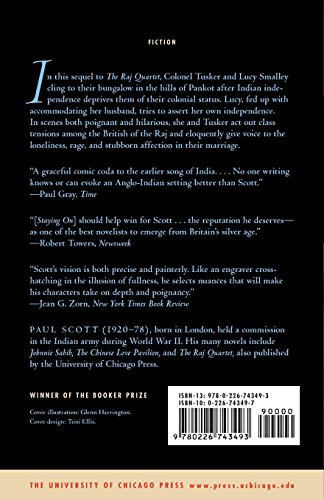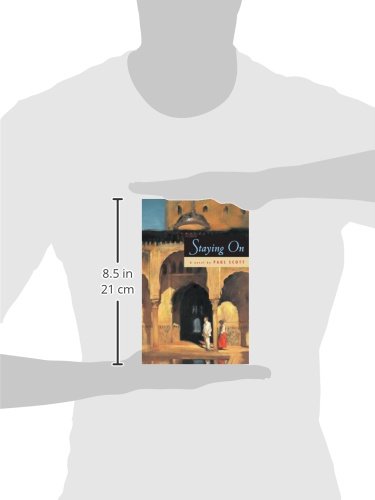



Staying On: A Novel (Phoenix Fiction)
B**J
Raj Quartet Sequel
Slow paced. Lovely descriptions of aging Brits and their 'hosts' in India after partition and the end of British rule.
J**.
An oustanding book about the last remnants of the English Raj living on in India: hilarious without ever condescending
A Quartet and a sequel (this volume), and I wish it went on for another five volumes. The writing is outstanding, and this time around they are mostly hilarious. I mean "laugh out loud funny." The Raj Quartet itself is generally much more sober, though it does have playful elements that never strike a wrong note. As for Staying On:British rule in India is long over, but Lucy and "Tusker" Smalley remember when things were different. Not better, because of course India had to be handed over to the Indians, it's just that one was born at the wrong time, too young to retire, too old to go "home" to England and start something new, especially since the trip home would cost most of one's savings and the old pension wouldn't be enough to live on. So, one stayed on and made do, and remembered the proper way to do things while enjoying, or pretending to enjoy, the new ways things were done. In fact, one remembered that the "proper ways" usually left one out in the cold, snubbed, at the bottom of the social hierarchy that was so strict in British India. Now, one was thrust in among the new Indian middle classes while keeping, on form alone, some connection to the Indian higher classes that came from new money, black market money.Without really thinking about it, one's true friends had become a most peculiar assortment of people from varying classes, divided by community stature, wealth, poverty, religion, employment, history, and interests, and often united only by a common friendship with one's self. Extraordinary, really. Better not to think about it, just to press on and have another drink and walk the blasted dog and rage about whatever seems to be most annoying this particular day. At least, Tusker would rage, but never Lucy, though she was built of stern stuff, just on a tiny frame and hidden by a graciousness that was not apparent 30 years ago, in the company of women who constantly snubbed her because she had once had to work for a living. No, in those days she seemed timid, compliant and always to be saying the wrong thing.This book plays no favorites. People are shown to be who they are, and they are individuals who may be Christian, Muslim, Hindu or Sikh. They are imperfect, some more so than others. The humor arises from their interactions with each other, their private thoughts, the poor versions of each others' languages they speak and the miscommunications that result, the great miscommunications between husband and wife that cannot be blamed on language barriers, as well as the almost telepathic communication between people who have known each other for 30 or more years, even if they don't speak each others' languages at all well. Sometimes it is enough to marvel at the sound of a new English word added to one's vocabulary, and to attempt to tease out its meaning from the context. Sometimes it is enough to delight in the hard and skillful work of a young orphan who tends a garden and has taken it upon himself also to tend the old graveyard next to St. John's, the graveyard where old Mabel Layton was the last person to be buried according to Mr. Maybrick's history of the town. Well, he's got that wrong, too. Maybrick was the last person buried there. And so it goes...
R**E
A wry sequel
In calling STAYING ON a sequel, I am not referring primarily to Paul Scott's celebrated RAJ QUARTET ; this little postlude is softer in tone, and although sharing some characters, it stands entirely on its own. But it is a sequel to several centuries of British life in India, and to two of those lives in particular: Col. Tusker Smalley and his wife Lucy. The novel opens with Tusker's death in 1972, 25 years after India gained independence. Remaining after others have left, he and Lucy have settled in the small hill town of Pankot. They live now in the annexe to the old-style Smith's Hotel, which is itself overshadowed by the snazzier Shiraz next door; the old British ways are not the only ones dying out. [Scott's post-colonial world is not so different from that of a more recent Booker Prize winner, THE INHERITANCE OF LOSS by Kiran Desai.]Scott's unlikely representative of the new order is the odiously comic Mrs. Bhoolabhoy, a vastly overweight and capricious empress who has purchased Smith's and married its former manager, enslaving him as her factotum and occasional sexual partner. Her driving ambition is to play with the big boys, and nothing or nobody will stand in her way. Poor Mr. Bhoolabhoy is one of a number of Indians whose lives were shaped by an almost-feudal relationship with the British Raj; in a sense, they have also been left stranded. He is also churchwarden for the Anglican church, whose services have been reduced to one per month. When a new priest arrives, a dark-skinned High Anglican from Southern India, Bhoolabhoy feels that everything has fallen apart. But the newcomer has great charisma and quickly revitalizes the little community; it is a small but welcome assurance that a successful grafting of the old and the new may still be possible.The core of the book, however, is Lucy's story. The action jumps back three months before Tusker's death to the time of his first attack. During this short period, whether through Lucy's petty skirmishes with her husband, or her explanations to correspondents both real and imaginary, we are taken back to a vanished age, the colonial India of books from EM Forster's A PASSAGE TO INDIA through Scott's own RAJ QUARTET. Lucy's memories, though long, are not always happy; this is a world of strict hierarchy and petty snobbery, dominated by bored memsahibs who patronize Lucy as only a poor clergyman's daughter. Tusker's career has suffered as a result, exacerbated by the combination of limited talent and stubborn pride. Fueled by regrets, their relationship has become a continual squabble that teeters on the far side of comedy. But at the very end, Tusker writes Lucy a letter apologizing for his inadequacies; it is the loveliest thing she has ever had from him, and a moving end to this wry tragicomedy of a book.
A**N
Staying On: The Sequel to the Raj Quartet
Staying on is almost the perfect sequel to the Raj Quartet -- I say "perfect," because at the end I couldn't help wishing that it had been 800 or more longer. Paul Scott has the most beautiful writing style that you become immersed in the story and invested in the characters.Staying On is the story of Lucy and Tusker Smalley, who chose to stay on in India after Independence, rather than return to England. This couple made brief appearances in the Raj Quartet, principally Lucy, who (poor dear) wound up as being the secretary to almost all of the women's committees during World War II. The Tuskers are back in Pankot, and Lucy is Not Happy. Tusker, her husband, cannot communicate and tells her little if anything about their finances. On top of that, they are residents in The Lodge, an adjunct to the Smith Hotel -- which is now in fierce competition with the Shiraz Hotel, a new and very modern hotel owned and run by Mrs. Lila Bhoolabhoy, who is a hoot and a half.Unlike the Raj Quartet, Staying On is far more humorous, yet one finds oneself still invested in Tusker and Lucy, as "small" in Staying On as their appearances were in Raj Quartet. Scott's skill in handling characters makes our investment inevitable, but he does it so pleasantly that one doesn't feel as if being unwillingly dragged along behind a dray cart.Any more detail than this would, I feel, spoil the reading experience for others, so I will leave it to others to make these wonderful discoveries on their own.I highly recommend this book and it is tucked into my library under Books To Be Reread Over and Over.
M**X
Staying Power
Staying On is ostensibly a novel about India after 1947, when many of the English people who were running things, before India gained independence, have returned home. But actually, to a great extent, it’s simply about people and the way they behave towards one another, including the way the various ethnic groups look upon each other.Paul Scott’s characters are both comic and tragic - he has the horrendous and tyrannical Mrs Bhoolaboy and her meek husband, exaggerated caricatures, who could almost have been extracted from a saucy sea-side postcard the fifties. Then he has Tusker and Lucy Smalley - and Lucy has certainly ‘stayed on’ as far as their marriage is concerned. The book describes the disappointments and disillusionments of a couple who have spent forty years together and who are now aware of the lack of success of their lives. Lucy has elaborate strategies to deal with her husband’s eccentricities, and though eventually, they seem to love one another, for the most part, they seem to be living in a state of war, a situation which may be familiar to long married couples.It is on balance, a sad book, but with some laugh out loud scenes - and one which causes you to care about some of the main characters, while thoroughly disliking others.
M**M
A good read
I really got inside the main characters heads and could empathize with how they felt. At times it was a little hard to follow as their thoughts were sometimes quite random but that's often the case. It sounds morbid but we're all going to die some day and reading this book can kind of prepare you for what's coming. That can only be a good thing.
B**O
If you liked The Raj Quartet, you will enjoy this ...
I had just finished reading The Raj Quartet and couldn't resist getting this book to see what happened to the two peripheral characters, Lucy and Tusker. It is without the drama of the Quartet, but a charming story which tells of the difficulties faced by an elderly couple who decide for financial and emotional reasons to remain in India after independence. We follow them through battles with their landlady (hilarious), Tusker's increasing dependence on alcohol (embarrassing and hilarious) and Lucy's attempts to stretch an inadequate income to cover living expenses (sad). However, through the whole book there remains the overwhelming sense that throughout all the vicissitudes of their lives, Lucy and Tusker are very much a devoted couple. This book is a love story - albeit an unusual one.
J**M
Good book
I have almost finished this book and have enjoyed it more and more as the story has developed. I love the insights into the thoughts and feelings of the main couple of characters. It seems fantastic that a man could be so convincingly inside a woman's mind. The place, people and sense of history are evoked beautifully, even though the actual surrounds are rather shabby. I have developed considerable sympathy for the people, even with all their many vanities and foibles.It has a structure and style which carries one along very well.
M**N
Staying on
The last of Paul Scott's excellent novels dealing with the retreat of the British from Imperial India. Funny and sad. Tusker Smalley and his wife Lucy end their days in an hotel 'Smith's', owned by Mrs Bhoolabhoy.Marion Hailey Oxfordshire
Trustpilot
1 day ago
1 month ago